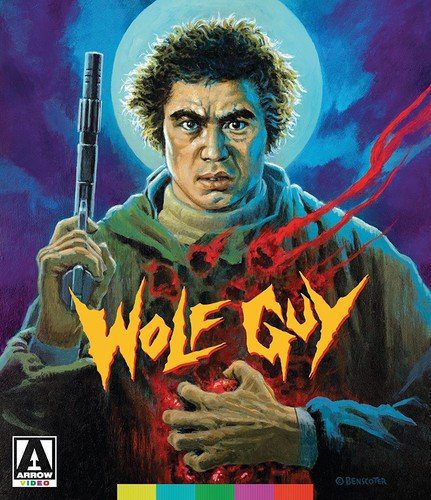
Much like vampirism, the subject of lycanthropy is generally reserved for horror films. Or perhaps a comedy horror film. There have even been action horror comedies pertaining to the subject of werewolves and shapeshifters. But there are very few movies like Wolf Guy floating about. In fact, I think Kazuhiko Yamaguchi’s Wolf Guy may be a real one-of-a-kind filmic outing; a gory, over-the-top Japanese action thriller which has very little to do with the common folklore western civilization seems to be better familiar with. But then, I can’t even say Wolf Guy‘s peculiarity is purely attributable to a foreign culture clashing with another.
Honestly, most of the Toei Production’s bizarre charms seem to be from a budgetary origin, which actually makes it a little more interesting than it probably should be. Much like Jean-Luc Godard’s Alphaville was a tongue-in-cheek espionage science fiction film with no special effects whatsoever, Urufu gai: Moero ôkami-otoko (or Wolf Guy: Enraged Lycanthrope, as the full translation goes) is a werewolf horror film without any werewolves. Or horror. Of course, when you have internationally renown Japanese action icon Sonny Chiba as your star, there’s simply no need to make any bones about what your werewolf movie is supposed to be about.
That said, I’m still unclear as to what Wolf Guy is about.
Fresh from his stint in the hugely popular Street Fighter series, Shin’ichi Chiba takes center stage in the moonlight here as the last survivor of a remote mountain clan of wolf-people. While he seems quite unable to transform into a hairy beastie, he nevertheless possesses a variety of other supernatural powers, including the enviable ability to regenerate damaged tissue. If you cut him open and pull his intestines out, he can harness the magical qualities of the full moon to pull his innards back inside and then zip his wound up as if it were nothing. And the only reason I know that much about him is that such a jaw-droppingly amazing moment actually happens in Wolf Guy.
The story opens with anti-hero private detective Akira Inugami (Chiba) witnessing the inexplicable slaying of a man torn to shreds by an invisible tiger. It has something to do with drugs, naturally ‒ be it the kind the film’s vile gangsters give to the poor nightclub singer they once kidnapped and raped, or the variety the filmmakers must have frequently employed in the making of this movie. Somehow putting the pieces together, Akira soon encounters a bigger problem: a clandestine J-CIA outfit way too keen to study him and make use of his unique gifts. And just when you think you’re starting to get the story on a leash, it shifts gears and heads for the hills for a bloody good shootout.
Needless to say, the storytelling qualities of this manga adaptation might leave a bit to be desired. Actually, they leave quite a lot in the darkness, opting instead to deliver a wild ride that would have found a loving home in a 42nd Street grindhouse theater back in the day. Alas, despite having everything such an audience could ever want ‒ such as equal measures of nudity, sex, violence, gore, and a marvelously funky ’70s score that won’t quit ‒ Wolf Guy never found its way to the shores of the United States for what I imagine would have been a heavily censored domestic exhibition. Which is a pity, as I’m sure an English dubbed track would’ve made this one a true howler.
The placing of Wolf Guy into the dog house wasn’t limited to the U.S. alone, however. Even in Japan, the title seemed to fall from grace, winding up somewhere in the department of obscurity shortly after its release. Despite the unfortunate fact that it only took 42 years for Wolf Guy to make its US debut, I think it was well worth the wait to see something I had never even so much as heard or seen in passing. The dementedly stylish hallucinogenic ride though weirdsville receives a transfer from Arrow Video that is most decent considering the film’s age and the lack of love it has received over the years. Put simply: it isn’t the best, but it’s all we have, so you’ll just have to accept it.
Accompanying the 2.35:1 scope presentation here is an LPCM mono score which is slightly better than the visual aspect. Removable English (SDH) subtitles are included (they had better be, right?), as are a handful of special features which ultimately shed a little light on the film’s origin. First off, there’s an interview with director Kazuhiko Yamaguchi, who lets it be known immediately from the get-go that he never wanted to direct the film in the first place, and is nevertheless surprised the film has developed a cult following in the States. Producer Toru Yoshida also receives a new interview here, as does the one and only Sonny Chiba himself, who talks about his long and varied career.
Wrapping up this wondrous parade of weird eye candy from Toei is the title’s original theatrical trailer and a collectible booklet (featuring an essay on the film by Patrick Macias, as well as a look at bizarre history of similarly-themed oddities from the Land of the Rising Sun by Jasper Sharp), which is only limited to the first pressings of this Blu-ray/DVD Combo release from Arrow Video. The title also features reversible artwork, including a newly commissioned design by Wes Benscoter. All in all, it’s more than I had expected for a movie that darn near disappeared altogether. Ultimately, much like a faithful three-legged dog, Wolf Guy is more about what it has going for it rather than what it is lacking.
And after spending some time getting to know Wolf Guy, I can say this is something worth barking at the moon about. Even if I still have no idea what it was about. Enjoy.